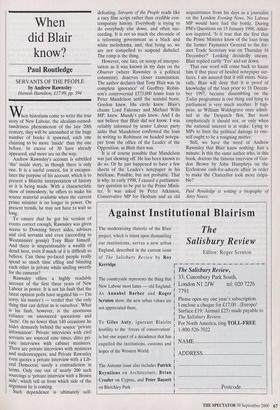When did Blair know?
Paul Routledge
SERVANTS OF THE PEOPLE by Andrew Rawnsley Hamish Hamilton, £17.99, pp. 394 When historians come to write the true story of New Labour, the idealism-turned- tawdriness phenomenon of the late 20th century, they will be astonished at the huge number of books it spawned, each one claiming to be more 'inside' than the one before. In excess of 30 have already appeared, and more are on the way.
Andrew Rawnsley's account is subtitled `the' inside story, as though there is only one. It is a useful conceit, for it encapsu- lates the purpose of his account, which is to present a Blairite interpretation of history as it is being made. With a characteristic show of immodesty, he offers to make his source material available when the current prime minister is no longer in power. On present trends, he may not have to wait so long.
To ensure that he got his version of events correct enough, Rawnsley was given access to Downing Street aides, advisers and civil servants and even (according to Westminster gossip) Tony Blair himself. And there is unquestionably a wealth of detail here, even if much of it is difficult to believe. Can these po-faced people really spend so much time effing and blinding each other in private while smiling sweetly for the cameras?
Rawnsley offers a highly readable account of the first three years of New Labour in power. It is not his fault that the latest opinion polls have negated his — I'm sorry, his master's — verdict that 'the only thing that can defeat us is ourselves'. What is his fault, however, is the enormous reliance on unsourced quotations and `facts'. On no fewer than 140 occasions he hides demurely behind the source 'private information'. Private interviews with civil servants are sourced nine times, ditto pri- vate interviews with cabinet ministers. There are private interviews with ministers and understrappers, and Private Rawnsley even quotes a private interview with a Lib- eral Democrat, surely a contradiction in terms. Only one out of nearly 200 such sourcings is 'private interview with a Brown aide', which tell us from which side of the argument he is coming.
Such dependence is ultimately self-
defeating. Servants of the People reads like a racy film script rather than credible con- temporary history. Everybody is trying to do everybody else down, and often suc- ceeding. It is not so much the chronicle of a reforming government as a black and white melodrama, and, that being so, we are not compelled to suspend disbelief. The romp is the thing.
However, one fact, or scoop of interpre- tation as it was known in my days on the Observer (where Rawnsley is a political columnist), deserves closer examination. The author declares that Tony Blair was in complete ignorance' of Geoffrey Robin- son's controversial £373,000 home loan to Peter Mandelson until the scandal burst. Gordon knew. His circle knew. Blair's chums Lord Falconer and Michael Wills MP, knew. Mandy's pals knew. And I do not believe that Blair did not know. I was reliably informed by senior Labour party aides that Mandelson confirmed the loan in writing to Robinson on headed notepa- per from the office of the Leader of the Opposition, as Blair then was.
It is of course possible that Mandelson was just showing off. He has been known to do so. Or he just happened to have a few sheets of the Leader's notepaper in his briefcase. Possible, but not probable. That is why, in early 1998, I caused a parliamen- tary question to be put to the Prime Minis- ter. It was asked by Peter Atkinson, Conservative MP for Hexham and an old
acquaintance from his days as a journalist on the London Evening News. No Labour MP would have had the bottle. During PM's Questions on 13 January 1998, Atkin- son inquired, 'Is it true that the first that the Prime Minister knew of the loan from the former Paymaster General to the for- mer Trade Secretary was on Thursday 16 December?' Looking decidedly uneasy, Blair replied curtly 'Yes' and sat down.
That one word will come back to haunt him if that piece of headed notepaper sur- faces. I am assured that it still exists. Natu- rally, Blair will deny that it is proof of knowledge of the loan prior to 16 Decem- ber 1997, because dissembling on the Today programme is one thing and lying to parliament is very much another. It hap- pens, as William Waldegrave once admit- ted at the Despatch Box. But most emphatically it should not, or only when the national interest is at stake. Lying to MPs to limit the political damage to one- self ought to be a resigning matter.
Still, we have the word of Andrew Rawnsley that Blair knew nothing. Just a minute. Is this the same author who, in this book, doctors the famous interview of Gor- don Brown by John Humphrys on the Ecclestone cash-for-adverts affair in order to make the Chancellor look more culpa- ble?
Paul Routledge is writing a biography of Airey Neave.


























































































 Previous page
Previous page